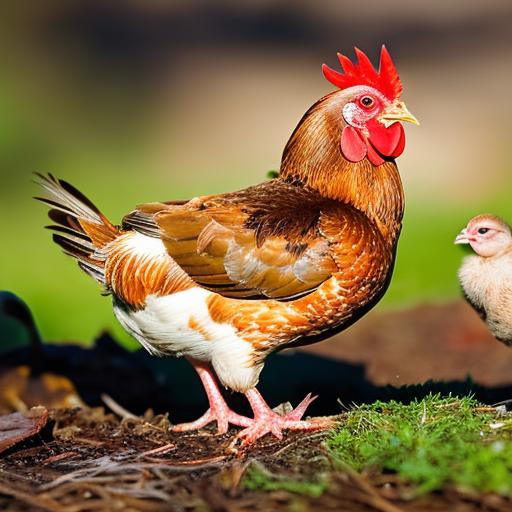Keeping chickens as a hobby or for their eggs has become increasingly popular in recent years. Many people are drawn to the idea of having their own fresh eggs and enjoying the company of these charming and often quirky birds. Backyard chicken keeping allows individuals to have a direct connection to their food source and experience the joy of caring for animals. Whether you live in a rural area or an urban setting, keeping chickens can be a rewarding and fulfilling endeavor.
Key Takeaways
- Keeping chickens requires a chicken coop to provide shelter and safety.
- Understanding chicken behavior is important for their health and well-being.
- Keeping chickens can be messy, but regular cleaning and waste management can help.
- Proper hygiene and pest control are necessary for keeping chickens healthy.
- Despite the mess, keeping chickens can provide numerous benefits for their owners.
The Importance of a Chicken Coop
One of the first things you’ll need when keeping chickens is a chicken coop. A chicken coop is essential for providing a safe and secure environment for your birds. It protects them from predators, provides shelter from the elements, and gives them a designated space to roost and lay eggs. There are various types of chicken coops available, ranging from small portable coops to larger, stationary structures.
When choosing a chicken coop, it’s important to consider the size and number of chickens you plan to keep. The coop should provide enough space for the birds to move around comfortably and have separate areas for nesting and roosting. It should also have proper ventilation to prevent moisture buildup and ensure good air circulation. Additionally, the coop should be predator-proof, with sturdy walls and secure doors to keep out unwanted visitors.
Understanding Chicken Behavior
To effectively care for chickens, it’s important to have a basic understanding of their behavior. Chickens are social animals that thrive in groups, so it’s recommended to keep at least three or four birds together. They have a natural pecking order, with one dominant bird taking charge. Chickens also have specific behaviors related to feeding, roosting, and laying eggs.
Chickens are diurnal animals, meaning they are most active during the day and sleep at night. They enjoy scratching the ground for insects and other tasty treats, so providing them with a designated area for foraging is important. Chickens also have a natural instinct to roost, so it’s essential to provide them with sturdy roosting bars or platforms in the coop.
The Messy Reality of Keeping Chickens
While keeping chickens can be a rewarding experience, it’s important to acknowledge that it can also be messy. Chickens produce waste, and they do so frequently. This waste can accumulate in the coop and create an unpleasant odor if not properly managed. Additionally, chickens can be messy eaters, scattering feed and creating a mess around their feeding area.
Another messy aspect of keeping chickens is the dust they create when they scratch the ground. This dust can settle on surfaces in and around the coop, requiring regular cleaning to maintain a clean and hygienic environment. It’s also worth noting that chickens molt, shedding their feathers and creating another mess to clean up.
Cleaning the Chicken Coop: Tips and Tricks
Regular cleaning of the chicken coop is essential for maintaining a healthy environment for your birds. Here are some tips and tricks to help you clean your coop efficiently:
1. Remove soiled bedding: Start by removing any soiled bedding from the coop. This includes droppings, wet straw or shavings, and any other debris that may have accumulated.
2. Scrub the surfaces: Use a mild detergent or poultry-safe disinfectant to scrub the surfaces of the coop, including walls, floors, and nesting boxes. Pay special attention to areas where waste tends to accumulate.
3. Rinse with water: After scrubbing, rinse the coop thoroughly with water to remove any remaining cleaning solution or debris.
4. Allow to dry: Once the coop is rinsed, allow it to air dry completely before adding fresh bedding or allowing the chickens back inside.
It’s important to note that cleaning should be done regularly, ideally on a weekly basis. This will help prevent the buildup of waste and keep the coop smelling fresh.
Dealing with Chicken Waste

Chicken waste comes in various forms, including droppings, feathers, and bedding material. Managing these waste products is an important part of keeping a clean and hygienic coop. Here are some tips for dealing with chicken waste:
1. Regularly remove droppings: Chicken droppings should be removed from the coop on a daily basis to prevent the buildup of waste. Use a shovel or rake to scoop up the droppings and dispose of them in a compost bin or designated waste area.
2. Compost bedding material: Bedding material, such as straw or wood shavings, can be composted along with other organic matter. Composting chicken waste not only helps reduce waste but also creates nutrient-rich compost that can be used in your garden.
3. Use deep litter method: The deep litter method involves adding fresh bedding material on top of the existing litter instead of removing it completely. As the chickens scratch and move around, their waste gets mixed with the bedding, creating a composting effect. This method can help reduce odors and minimize the need for frequent cleaning.
Managing Odor and Pest Control
Odor control is an important aspect of keeping chickens, especially if you live in an urban or suburban area where neighbors may be sensitive to smells. Here are some tips for managing odor in the chicken coop:
1. Proper ventilation: Ensure that your coop has adequate ventilation to allow for good air circulation. This will help prevent moisture buildup and reduce the risk of odors.
2. Regular cleaning: As mentioned earlier, regular cleaning is essential for odor control. Removing droppings and soiled bedding on a regular basis will help keep the coop smelling fresh.
3. Use natural odor absorbers: Place natural odor absorbers, such as baking soda or activated charcoal, in the coop to help absorb any lingering odors.
In addition to odor control, pest control is another important aspect of keeping chickens. Pests such as mites, lice, and rodents can be a nuisance and pose a threat to the health of your birds. Here are some tips for natural pest control in the chicken coop:
1. Keep the coop clean: Regular cleaning and removing waste will help deter pests from taking up residence in the coop.
2. Use diatomaceous earth: Diatomaceous earth is a natural pest control product that can be sprinkled in the coop to help control mites and lice. It works by dehydrating and killing these pests.
3. Secure the coop: Ensure that the coop is secure and free from any openings or gaps that pests could use to gain access.
Keeping Chickens Healthy and Hygienic
Keeping chickens healthy and hygienic is crucial for their well-being and the quality of their eggs. Here are some tips for maintaining good hygiene in the chicken coop:
1. Provide clean water: Chickens require fresh, clean water at all times. Make sure to regularly clean and refill their water containers to prevent the growth of bacteria.
2. Practice biosecurity: Biosecurity measures, such as limiting contact with other birds and disinfecting equipment, can help prevent the spread of diseases among your flock.
3. Monitor for signs of illness: Regularly observe your chickens for any signs of illness, such as changes in behavior, decreased appetite, or abnormal droppings. If you notice any concerns, consult a veterinarian who specializes in poultry health.
The Benefits of Keeping Chickens Despite the Mess
Despite the mess that comes with keeping chickens, there are numerous benefits that make it worth the effort. One of the main benefits is having a constant supply of fresh eggs. There’s nothing quite like collecting eggs from your own backyard and knowing exactly where they came from. Fresh eggs are also known to be more nutritious and flavorful than store-bought eggs.
Keeping chickens can also be a fun and educational hobby. Chickens have unique personalities and can provide hours of entertainment with their antics. They can also teach valuable lessons about responsibility, animal care, and the cycle of life.
Additionally, chickens can be a valuable addition to your garden. Their waste can be composted and used as fertilizer, enriching the soil and promoting healthy plant growth. They also help control pests by eating insects and other garden pests.
Is Keeping Chickens Worth the Effort?
In conclusion, keeping chickens can be a rewarding and fulfilling experience, despite the mess that comes with it. By providing a safe and comfortable environment for your birds, regularly cleaning the coop, managing waste, and practicing good hygiene, you can minimize the downsides of keeping chickens.
The benefits of fresh eggs, a fun hobby, and a connection to your food source often outweigh the mess. With proper care and attention, keeping chickens can be a delightful addition to your backyard or urban homestead. So, if you’re considering keeping chickens, don’t let the mess deter you. Embrace the opportunity to care for these charming creatures and enjoy the many rewards they bring.
If you’re wondering about the messiness of keeping chickens, you might also be interested in learning how to insulate a chicken coop. Insulating your coop can help regulate temperature and keep your chickens comfortable throughout the year. It can also help reduce moisture and odor, making it easier to maintain a clean and hygienic environment for your feathered friends. Check out this informative article on how to insulate a chicken coop for practical tips and step-by-step instructions.
FAQs
What is the natural behavior of chickens?
Chickens are naturally social animals that love to scratch and peck at the ground, dust bathe, and roost at night.
Do chickens make a lot of noise?
Yes, chickens can be noisy, especially when they are laying eggs or when they feel threatened. However, some breeds are quieter than others.
Are chickens messy?
Chickens can be messy, especially when they are eating or drinking. They also produce droppings, which need to be cleaned regularly to prevent the buildup of bacteria and odors.
What kind of housing do chickens need?
Chickens need a secure coop to sleep in at night and a run or fenced area to roam during the day. The coop should be well-ventilated and have nesting boxes for the hens to lay their eggs in.
What do chickens eat?
Chickens eat a variety of foods, including grains, vegetables, fruits, and insects. They also need access to clean water at all times.
Do chickens require a lot of maintenance?
Chickens require daily maintenance, including feeding, watering, and cleaning their coop and run. They also need regular health checks and may require occasional veterinary care.
Can chickens be kept in urban areas?
Yes, chickens can be kept in urban areas, but it is important to check local laws and regulations before keeping chickens. Some cities have restrictions on the number of chickens that can be kept and may require permits.
Meet Walter, the feathered-friend fanatic of Florida! Nestled in the sunshine state, Walter struts through life with his feathered companions, clucking his way to happiness. With a coop that’s fancier than a five-star hotel, he’s the Don Juan of the chicken world. When he’s not teaching his hens to do the cha-cha, you’ll find him in a heated debate with his prized rooster, Sir Clucks-a-Lot. Walter’s poultry passion is no yolk; he’s the sunny-side-up guy you never knew you needed in your flock of friends!








